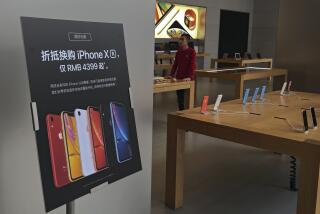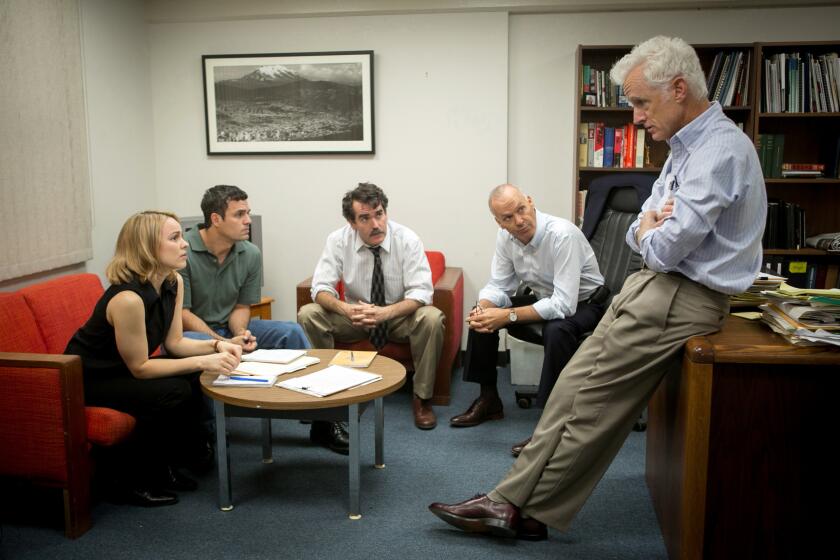Apple’s profit nearly doubles
Apple Inc. regained some of its shine as its star — and profit — continued to rise quickly in the East.
Though the company’s stock has been dropping in recent weeks as investors worried about the possibility that Apple was selling fewer iPhones in the U.S., the company’s record earnings report Tuesday suggested that Wall Street had been looking in the wrong direction.
Nearly 20% of Apple’s $39 billion in quarterly revenue came from China and surrounding countries, more than tripling its income from that region a year ago. Chinese bought five times the number of iPhones they did a year earlier, Apple said, further showing that Asia is becoming one of Apple’s most important and lucrative markets.
“It was an incredible quarter in China,” said Apple chief executive Tim Cook in a conference call with investors, noting that the company’s latest iPhone went on sale there in January, and has been a hit with the Asian nation’s fast-expanding middle class. “It is mind-boggling that we could do this well.”
The strong earnings report sent Apple shares up $41, or 7.31%, to $601, erasing part of a weeks-long decline that saw the stock lose 13% since its all time high of $644 on April 10.
Those declines stemmed in part from the perception that Apple might start losing business from its largest U.S. customers, AT&T and Verizon Wireless. The two leading wireless carriers have endured years of tightening profit margins from the high cost of providing Apple’s iPhone to its customers, generally paying Apple hundreds of dollars for each device to lower the price for consumers.
Last week Verizon shifted some of that cost to its customers, charging a $30 fee to anyone upgrading to a new phone. AT&T has also limited consumers’ ability to cheaply switch to newer phones, causing analysts to worry that people may be less likely to buy new iPhones — an outcome that could hurt Apple sales.
AT&T said Tuesday that it sold 4.3 million iPhones, up from 3.6 million a year earlier but down significantly from the 7.6 million iPhones the carrier added in the prior quarter, after the iPhone 4S model launched. Verizon’s iPhone sales declined 24% from the previous quarter.
Still, concerns about U.S. sales largely dissipated Tuesday as Apple’s $11.6 billion in profit nearly doubled from the same period last year, helping the company reach its best second quarter on record, a quarterly performance behind only the three months ended in December.
“AT&T and Verizon are still important, but they’re not as important as people think,” said Shaw Wu, an analyst at Sterne Agee. “International strength more than offset some weaker trends in the U.S.”
Apple’s newest iPhone, the 4S, went on sale in 21 new countries in January, including China, where one of the nation’s largest carriers, China Telecom, began carrying the phone in March. Analysts frequently note that Apple is still likely to announce a new partnership with China Mobile, whose 600 million subscribers make it by far the largest wireless provider in China.
Apple sold 35.1 million iPhones in the quarter, an 88% increase over the same quarter a year ago, and just shy of the company’s quarterly record of 37 million, set in the previous quarter. The company has sold 218 million iPhones since the device went on sale in mid-2007.
Apple also sold 11.8 million iPads during the period, the first full quarter that the newest iPad has been available, and the best non-holiday quarter yet for Apple’s hit tablet device.
Cook also addressed Apple’s ongoing patent disputes with rivals that manufacture smartphones running Google Inc.’s Android operating software. Among the dozens of patent lawsuits around the globe, Apple has won some battles and lost others, including a tentative ruling against it at the U.S. International Trade Commission, which, if upheld, could result in the ban of some iPhones and iPads from sale in the U.S.
The patent fights are largely thought to be a legacy of late Apple founder Steve Jobs, who believed Android smartphones copied the iPhone’s design and declared that he wanted to wage “thermonuclear war” on rivals.
Cook appeared to take a softer stance Tuesday.
“I’ve always hated litigation and I continue to hate it,” Cook said. “I would highly prefer to settle versus battle. But, you know, the key thing is that it’s very important that Apple not become the developer for the world. We need people to invent their own stuff.”






